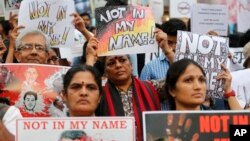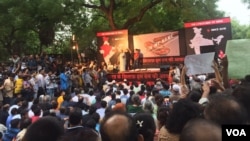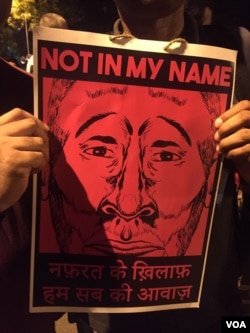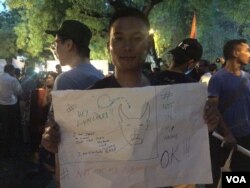Holding placards that read "Not in My Name," thousands of citizens demonstrated Wednesday in cities across India to protest recent attacks by mobs and cow vigilante groups on Muslims and lower caste Hindus.
The protests were held amid growing concerns over rising intolerance and criticism that Prime Minister Narendra Modi's Hindu nationalist government is not doing enough to rein in the attacks, usually sparked by suspicion of cow smuggling or the eating of beef.
Wednesday's citizens campaign to stop lynchings and mob violence was sparked by the killing of a Muslim teenager last week by about 20 men as he was returning home on a train with his brothers after shopping in New Delhi for the Eid festival.
Junaid Khan, 16, was stabbed after an altercation over the sharing of seats. But one of the men arrested said he attacked Khan and his brothers after he was told that they were beef eaters. One of the brothers, who sustained injuries, has said that the attackers "flung our skull caps, and taunted us about eating beef."
Eating beef is taboo to many Hindus, who regard the cow as a holy animal.
Cow as polarizing
But worry is growing that the cow is becoming a polarizing animal as the Hindu nationalist government tightens laws to protect it.
Another mob attack was reported Wednesday from Jharkhand state, where a man was severely beaten by a mob when a dead cow was found outside his home.
In April, a dairy farmer was killed by a mob in Rajasthan as he carried away cows he had bought at a cattle fair.
Human Rights Watch said in a report in April that at least 10 Muslim men have been killed in vigilante incidents. "Self-appointed cow protectors driven by irresponsible populism are killing people and terrorizing minority communities," the report said.
Documentary filmmaker Saba Dewan, whose online campaign sparked the protests, said the marches reflect the "anger and grief of the people" at the incidents. Protests were held in major cities such as New Delhi, Mumbai, Kolkata, Bengaluru and Hyderabad.
On Wednesday, Information and Broadcasting Minister Venkaiah Naidu condemned last week's attack on the Muslim teenager. "Any incident of such nature should be condemnable. It is brutal, atrocious."
Government apathy blamed
Naidu's comments came after opposition parties and critics slammed the ruling Bharatiya Janata Party for failing to speak up against the spate of mob attacks. Many protesters said they are worried the government's apathy in the face of the assaults could encourage more violence.
Ajoy Bose, an independent political analyst in New Delhi, says while hate crimes are not new and the attacks are sporadic, "What really differentiates this situation is that no one in power has even reacted or responded, kept silent. This somehow gives the impression that there is a tacit approval of what is going on. That is what is worrying."
Research scholar at a university in New Delhi, Lozaanba Khumbah, from the northeastern state of Manipur where beef is commonly consumed, said he joined the protest because people should not be targeted for their dietary preferences.
"We are a secular country, and it is important for us to discuss with each other when there are differences," Khumbah said.
Muslim leaders say the mob attacks and lynchings are creating a sense of insecurity in the community, which makes up about 14 percent of India's population.
"These attacks are creating a fear psychosis," said Kamal Faruqui of the All India Muslim Personal Law Board.







